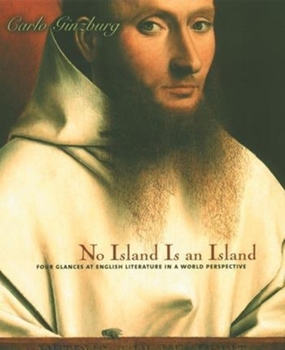No Island Is an Island: Four Glances at English Literature in a World Perspective
Select Format
Select Condition 
Book Overview
In No Island Is an Island an internationally renowned historian approaches four works of English literature from unexpected angles. Following in the footsteps of a sixteenth-century Spanish bishop we gain a fresh view of Thomas More's Utopia. Comparing Bayle's Dictionary with Tristram Shandy we suddenly enter into Laurence Sterne's mind. A seemingly narrow dispute among Elizabethan critics for and against rhyme turns into an early debate on English national identity. Robert Louis Stevenson's story "The Bottle Imp" throws a new light on Bronislaw Malinowsky's attempts to discover meaning in the "kula" trading system among the Trobriand Islanders. Throughout, Ginzburg's inquiry is informed by his unique microhistorical sensibility, his attention to minute detail, and his extraordinary synthesizing imagination.
Format:Hardcover
Language:English
ISBN:0231116284
ISBN13:9780231116282
Release Date:October 2000
Publisher:Columbia University Press
Length:128 Pages
Weight:0.50 lbs.
Dimensions:0.7" x 5.8" x 7.3"
Grade Range:Postsecondary and higher
Customer Reviews
1 rating
No, You Won't Like It.
Published by Thriftbooks.com User , 14 years ago
In fact, you'll probably hate it. You'll consider it pedantic, self-indulgent, post-modernist balderdash, which it is. You'll be offended by its "European" condescension toward anglophone intellectualism. You'll resent the arrogance of its unexplicated allusions and its provocative assumptions about what might constitute 'general knowledge'. You'll be dismayed that, even after the most attentive reading, you couldn't possibly identify Ginzburg's central theses. You'll be outraged that the man is not only smarter and more knowledgeable than you but that he insists on rubbing the fact in your weary eyes. If you manage to finish the four essays at all, you'll feel a burning compulsion to denounce this little book as the most pretentious, affected, obscurantist piece of academic self-massage you've ever read.... .... and yet it's of some value, at least if you are an armchair cultural historian. The four essays do address interesting subjects: 1) Thomas More's "Utopia" in relationship to non-English sources, especially the satires of Lucian; 2) the curious public debate among Elizabethan 'literati' about the function of rhyme in poetry, sketching a justification of rhyme as a 'national' characteristic of the rising barbarians; Sterne's bizarre novel "Tristram Shandy" as a trope upon the encyclopedic 'Dictionnaire historique" of Pierre Bayle and/or the psychology of John Locke; 4) the influence of the letters and short stories of RL Stevenson on the theories of the Polish anthropologist Bronislaw Malinowski. Now, it is surely true that scholars of English literature and cultural history have tended to be insular. Thus, Ginzburg's title and subtitle present an appropriate agenda: "No Island is an Island: Four Glances at English Literature in a World Perspective." I can willingly support that agenda. The probelm is that, for the vast majority of readers, Ginzburg's 'glances' are far too oblique or cross-eyed to be stimulating. Carlo Ginzburg's earlier books about witchcraft and heresy in pre-modern Italy were wonderfully readable, accessible to a general public. This book is not.






